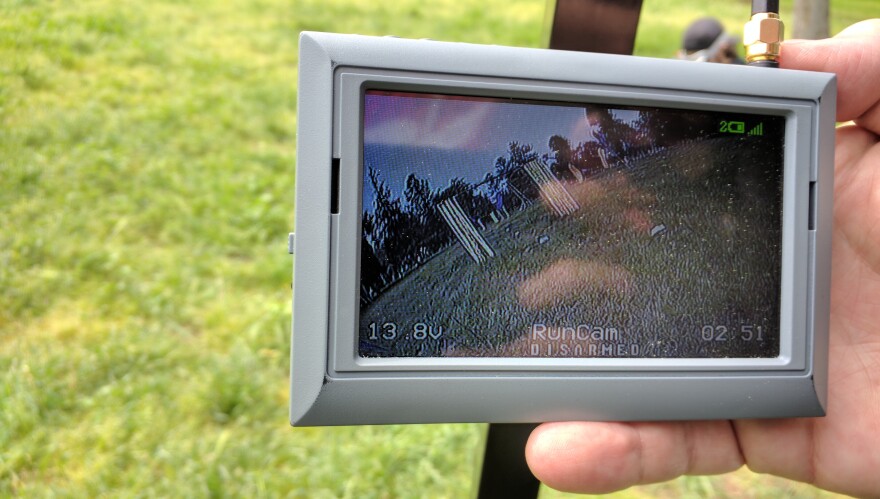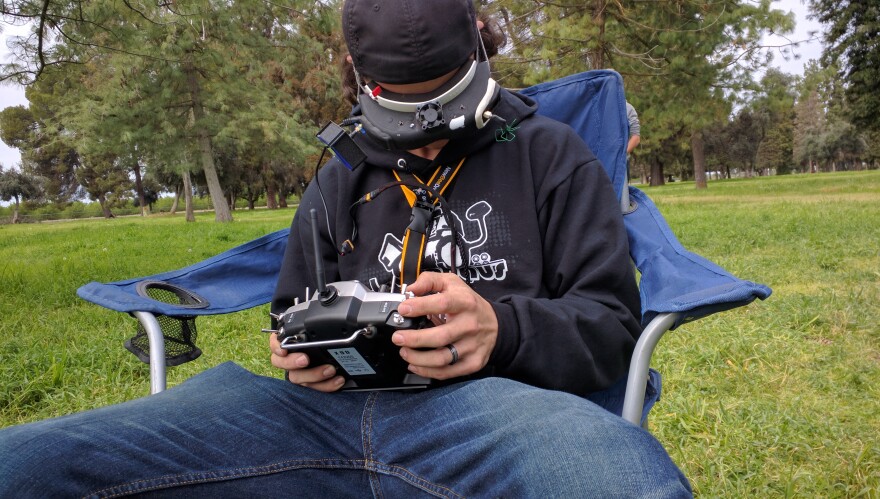On a sunny Sunday afternoon in March, Dennis Spear watches his 15-year-old son Matthew Spear pilot a tiny metal drone through a course at a park outside Fresno.

“[They’re] like a swarm of angry bees, ” Spear says.
Drones have exploded in popularity as the price of the tiny machines has fallen. More than 700-thousand drones were sold in the United States last year.
These drones aren’t what you may have seen in the neighborhood or heard about on the news. They are smaller than a Frisbee and are very light weight.
But Dennis says don’t underestimate them. He says their size makes them really fast and nimble.
“Compared to a high-performance jet aircraft, like a fighter aircraft, they might have two to one horsepower to weight ratio,” says Spear. “This has eight to 10 to one.”
Some drones can reach tops speeds over 100 miles an hour. At a drone race pilots have to guide their drones through a series of physical obstacles. Such as flying around a pole, going under or over a certain “My strategy is kind of go that way more over the pond because going through that gate going that way and trying to turn into the next gate is harder,” Matthew Spear says explaining his approach to the race.

Matthew dons a pair of large white goggles that completely cover his eyes. A tiny camera on the front of the drone beams an image back to the goggles nearly instantly. By looking through them it is like you are a tiny pilot literally in the drone.
“It looks like you are sitting in the front of the cockpit,” says Matthew Spear. “It is kind of a rush.”
The goggles also give detailed information about the drone such as how much battery life is left. Racers try to complete the course as many times as possible in two minutes. A computer tracks the lightening quick drones and marks their lap times.
It’s a balancing act says race organizer Taylor Ellis. Push too hard and you could crash, miss an obstacle or even run out of juice in your battery. Be too careful and, well, come in last. Racers compete against similarly sized drones based on their propeller size ranging from three to five inches.

Ellis says the tournament leader is a perfect example of hitting the drone racing sweet spot.
“He is not only fast but he is consistent,” Ellis says. “That is one of the most important things about drone racing. Because you can have somebody that is slower than you but if you crash out they will get more laps.”
Ellis got into drones a couple years ago before starting this chapter of the Multi GP Drone Racing League. Leagues like these are becoming more common throughout the Central Valley. There are just 19 registered pilots currently in Fresno. But next month there is a qualifying race in Bakersfield where more than 100 pilots are expected to race. Winners there move on to the state competition and then potentially onto a national tournament.
“It is starting to grow a lot more,” says Ellis. “We will have two or three people on a typical Sunday come up that are not part of the group and they just stumble across [us].”
However, this is not exactly the cheapest or easiest sport to get into.
At this race, there are table after table of spare parts, tools, and charging batteries. All the drones are built by hand with hundreds of intricate electrical and mechanical parts all needing to work together in perfect sync.
Ellis says getting started with your first drone can cost around $1,500.
“It definitely has its startup cost,” says Ellis. “But once you are involved and you are in it and have your gear it is easy to maintain. So if you look at it like cars or motorcycles or any other grown up hobby it is quite cheap. But if you compare it to a lot of kid’s hobbies it is quite expensive.”
For the father-son team of Dennis and Matthew Spear, it’s about more than just winning the race.

Dennis gets to share his lifelong love of flying and spend time with his son. But he also sees the educational opportunity.
“It is such a great vehicle for exploring aviation and science, technology, engineering, arts and math in general,” says Dennis Spear.
And maybe, even a career future in the growing field of robotics and automation. But it’s also really, really fun.


